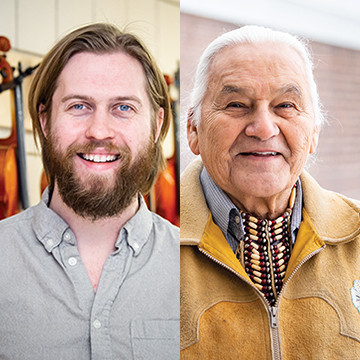Teachers across Manitoba are making conscientious efforts to integrate Indigenous perspectives and wisdom into their practice, opening the door to reconciliation with Canadian children and youth.
As a music educator in Seven Oaks School Division, I’m eager to incorporate Indigenous perspectives into my classroom and school community. I admit, though, that it hasn’t always been easy. I’ve been apprehensive at times, and I’ve had a lot of questions. Where do I begin? Am I approaching these songs and topics with respect and authenticity? How do I proceed? Fortunately, many of these anxieties were resolved after attending a professional development session with Elder Dr. Winston Wuttunee.
First-hand Experience
“My people and I come from the Eagle Hills in Saskatchewan,” says Elder Winston. “Our First Nations is now called Red Pheasant First Nations, after one of my ancestors. We have been chiefs since the early 1800s. I was hired specifically to start an Indigenous program of music to write songs in the “Y” dialect of the prairie Cree people. We also interviewed the old people to gather the history of every song.”
With an abundance of wisdom and lived experiences in Indigenous ways of knowing, Elder Winston accepted my invitation to come to our school to share the gift of music with my students. Since that day three years ago, we have collaborated both inside and outside the classroom, co-composing and performing music with students. And I have learned so much from his wisdom and perspective on education. With funding from the Manitoba Arts Council, we have been incredibly blessed to work and learn from him.
Elder Winston began collaborating in schools in Saskatchewan in 1973, with the Saskatchewan Indian Cultural College (now Saskatchewan Indigenous Cultural Centre). “I always feel culturally fulfilled in the role I play in Manitoba schools,” he says. “I have first-hand experience with what it is like to feel left out.”
“With my staff, we worked on every Cree First Nation in Saskatchewan. We use some of the Indigenous material with my work with Jordan. I start every session in school with a prayer. I was pleasantly surprised with one young East Indian student who said he knew the prayer song I sang. So we sang it with him and the other students applauded him for his fine work.”
Elder Winston notes the importance of recognizing the social and cultural diversity of Manitoba youth.
“It is important to help the many immigrants to Canada by including them in my songs. We can sing together and dance together. We have good fun learning about each other. Our questions are always respectful and thoughtful.”
This, he says, is what builds community, and the lessons resonate deeply with students and teachers alike.
“I am proud to be teaching Indigenous songs and dances to brown, black and white students. Indigenous dancing and languages, dress and customs are the main relevant topics we now teach as Indigenous teachers to non-Indigenous students. They seem to be the most important, and so we keep on going with that.”
Where to Start: Partnering with Elders and Knowledge Keepers
There is undoubtedly crucial value in partnering with community Elders or Indigenous Knowledge Keepers when initiating school-based projects concerning Truth and Reconciliation. However, not all teachers have the experience or relationships with members from the community and may be uncertain where to begin.
Elder Winston provides counsel for teachers: “First, they need to research the Elders working in the community. Find out if an Elder has the Indigenous knowledge of protocols and practices. It is very important to preserve the protocols and practices of our Ancestors.”
In addition to being mindful of the experience and wisdom the Elder brings, Elder Winston reminds us to be conscious of differences in cultural understanding.
“I would suggest teachers conduct research the same way they would if they were going to visit another country. Their physical, emotional, and mental needs are not necessarily the same as ours.”
It has been a tremendous honour learning from Elder Winston, and I am confident that other teachers across Manitoba share collaborative experiences similar to my own. In addition to working with our students in Seven Oaks, Elder Winston is highly sought after and continues to work with students across Manitoba, Saskatchewan, Alberta, and (with the assistance of technology) across the world.
This past February, Elder Winston worked with students in Ukraine, engaging in various cross-cultural learning experiences. In Manitoba, he is also involved with Pembina Trails School Division, sharing his insights with youth, as well as collaborating with other community Elders within the division.
Clearly, community Elders and Indigenous Knowledge Keepers have valuable wisdom that may benefit students and teachers alike. We have much to learn from their knowledge and perspectives on education and learning.
– Originally published in the Winter 2022 issue of the MB Teacher
Read More MB Teacher Features Here!

Jordan Laidlaw is a writer/contributor for the MB Teacher magazine and a teacher/executive member of the Seven Oaks Teachers’ Association.
Dr. Winston Wuttunee is a writer/contributor for the MB Teacher magazine and a community Elder and Indigenous Knowledge Keeper, receiving an honorary doctorate in letters from the University of Manitoba in 2019.
